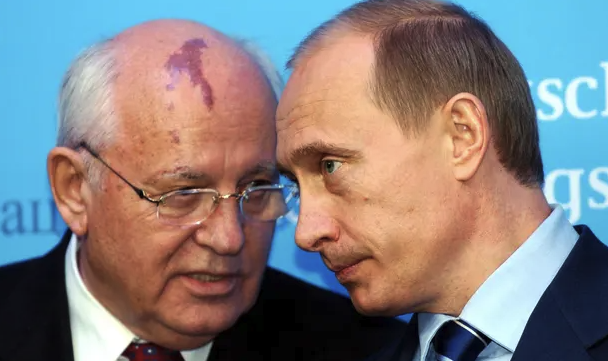In his later years, Mikhail Gorbachev would claim that the United States hadn’t won the Cold War, but rather that both sides had lost. This was obviously false; in military, political, and economic terms (not to mention psychological), only one side had been shattered.
That collapse, under the leadership of one man, was followed by the humiliation of the Yeltsin years, during which life expectancy tumbled, the military degraded and state resources were pillaged by a small cabal of gangsters. It was Gorbachev’s character and policy choices that had resulted in these failings, as well as his inability to implement the domestic reforms that were the only way for the state to survive.
By August 1991 Russia was barely functioning and Gorbachev’s authority was waning. He may have believed that his status as President of the U.S.S.R. alongside the threat of economic collapse could protect him from rivals, but Gorbachev soon found himself giving away significant political assets in exchange for good-faith agreements with politicians who despised him. “We do not need the President of the Union… We should remove this odious figure… who is clearly not our friend,” a Yeltsin aide declared on live television before one diplomatic conference. “We don’t need you,” republican rivals shouted to a visibly stuttering Gorbachev, “but you need us.” Publicly mocked and derided, all the while bowing to the demands of his adversaries, the President of the USSR had, in the words of his press secretary Andrei Grachev, reduced himself to a King Lear figure.
In March 1991, around 20% of those within the primary Soviet republics believed it to be better for the union to split than to remain unified. Just five months later, that figure had become a majority. This unravelling of support was not the result of a rapid collective liberalisation, but rather a desperate belief that a rejection of the central state, with its juntas, power vacuums, and collapsing economy, was the only way to restore law and order.
The transition from communism to capitalism under Gorbachev and Yeltsin left many Russians sceptical as to the benefits of liberalism. And no one understood this better than Vladimir Putin, who was chosen as Yeltsin’s successor eight years after the collapse of the Union. Putin had helped defeat the junta of 1991, and was intimately familiar with the deep fears and embitterment that the collapse had engendered. Many in the adolescent Russian state were convinced that its leadership should re-prioritise strong policies to create desperately-needed stability in a country that had suffered a long period of economic and social chaos.
After that, de-liberalisation was inevitable in Russia: no longer would that country suffer the instability and humiliation of the Gorbachev and Yeltsin years. Putin’s strong rhetoric would be backed up with domestic reforms and international aggression, culminating most recently with the invasion of Ukraine. Putin was (at least initially) widely admired within Russia for creating a form of stability and prosperity that had been lacking for decades.
Gorbachev’s glowing, post-retirement reception in the West was at stark odds with his legacy in Russia. For all too many Russians, he was a living reminder of the shame felt from 1991. At the time of his death, Gorbachev’s legacy had directly led to a form of the state that he abhorred. He may be remembered fondly in the West, but in his homeland he will be forever known as the man who crippled Russia.











Join the discussion
Join like minded readers that support our journalism by becoming a paid subscriber
To join the discussion in the comments, become a paid subscriber.
Join like minded readers that support our journalism, read unlimited articles and enjoy other subscriber-only benefits.
Subscribe